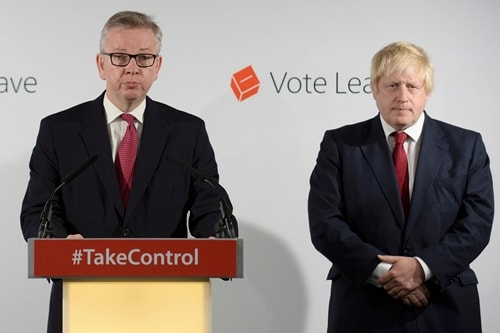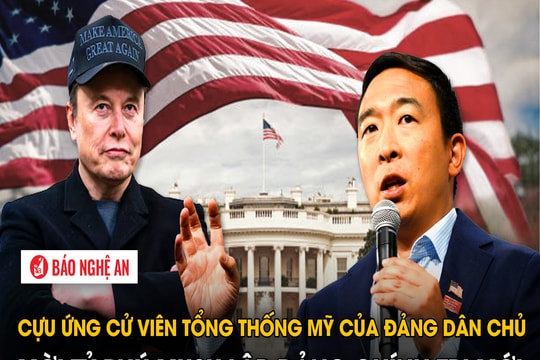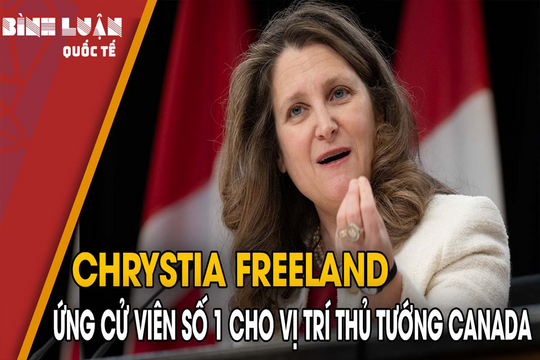What made the bright candidate fail to run for British Prime Minister?
As a leading candidate for the British prime minister position, former London mayor Boris Johnson has been criticized by his own allies as being unfit for the leadership position.
 |
Former London Mayor Boris Johnson (right) and British Justice Secretary Michael Gove in a speech to supporters of Britain leaving the EU on June 24. Photo: Reuters |
On the morning of June 30, Boris Johnson, the former London mayor who led the campaign to take Britain out of the European Union (also known as Brexit), was preparing to give a speech that would pave the way for him to enter the race for the position of British Prime Minister, after David Cameron announced his resignation. However, an unexpected development occurred.
At 9am London time, British Justice Secretary Michael Gove, a close ally of Mr Johnson who was expected to play a key role in the former mayor's campaign, surprised everyone by suddenly announcing he would run himself.
Not only that, Mr. Gove also attacked Mr. Johnson, saying: "I respect and admire all the candidates. In particular, I wanted to help build a team behind Boris Johnson, so that a politician who promotes Brexit can lead us to a better future. However, in the end, I reluctantly concluded that Boris does not have the leadership or the team to build the task ahead."
Two hours later, at his press conference, after speaking for 11 minutes on what kind of leader Britain needs, former mayor Johnson said: "After consulting with colleagues and considering the situation in parliament, I have concluded that that person cannot be me."
The Washington Post called the unexpected development a "betrayal", while Foreign Policy wrote: "Boris Johnson reached for the throne but was stabbed in the back".
Mr Gove's "ambush" of Mr Johnson has drawn criticism from supporters on both sides. When asked about Gove, Mr Johnson's father replied: "'Et tu, Brute' (you too, Brute?) is my comment on that." He referenced the last words of the Roman leader Julius Caesar when he was assassinated by his friend, expressing surprise at being betrayed.
Mr Gove's backer, Dominic Raab, said Mr Johnson had been "too cavalier" in his approach. "We elect a prime minister to lead the country, not a class president," he said.
Assumption
Johnson is a former mayor of London, as well as a writer and television personality. He is more famous than Gove and is arguably one of the most prominent British politicians. He has the ability to win over a large number of people, and that advantage has helped him serve two terms as mayor of London.
However, he is not popular in the House of Commons. He needs Mr Gove's help to convince MPs to support him, and when Mr Gove runs himself, Mr Johnson may find his chances are over. Moreover, a YouGov poll of Conservative Party members showed that Mr Johnson is even less popular than the other candidate in the race for prime minister, Theresa May, the Home Secretary. She won 55% of the vote in the poll, while Mr Johnson got only 38%.
To be eligible to run for British prime minister, a candidate must be nominated in writing by two Conservative MPs. If there are more than two candidates, Conservative MPs will vote to choose two. Finally, the party's 150,000 members will elect a leader, with the result expected to be announced on September 9.
In fact, Gove has repeatedly and emphatically said he has no interest in the party leadership role. In May, he said: "I don't want to do it because there are people better equipped than me to do it."
Guardian columnist Andrew Sparrow summed up his limitations: "He is notoriously impractical and unsophisticated. He doesn't like flying, and some of his intellectual interests are a little eccentric." But, Sparrow concluded, "It's rare for a politician to give up the chance to become prime minister."
The Financial Times reported that after the June 23 referendum, Mr Johnson stopped showing up for meetings, according to an unnamed ally. “He didn’t show the enthusiasm or give people the attention or make the promises that he should have.”
So, according to Slate, the leading theory explaining the “unexpected stumble” is that Mr. Gove pushed Mr. Johnson out because he saw that the former mayor could not win. Disappointed by the man he had supported, Mr. Gove decided to enter the race himself.
According to the Washington Post, in the days after the referendum, Mr. Johnson began to go back on his Brexit promises, signaling that he would be softer on immigration – a key issue in the campaign to take Britain out of the European Union (EU).
The paper suggested that Mr Johnson's inconsistency may have prompted Mr Gove, a true believer in Brexit and the intellectual architect of the campaign, to decide to undercut his own ally.
However, there are also conspiracy theories circulating. Some people believe that Mr. Gove set Mr. Johnson up to alienate his supporters by softening his stance on immigration in an editorial published in the Telegraph earlier this week. Some reporters say Mr. Johnson’s article was edited by Mr. Gove.
There is also the theory that Mr Johnson has realised that being prime minister after Brexit will be a huge headache. The new prime minister will have to ease the hostility between the Remain and Leave camps, soften the hard-line Leave camp, and negotiate with the EU. Those who put forward this theory argue that for someone like Mr Johnson, there are more pleasant ways to be popular than taking on the heavy responsibility of prime minister.
Mr Gove may face backlash for his actions. Even if the Conservatives accept his claim that former Mayor Johnson is too disorganized to lead the party and the country, disloyalty is never going to win sympathy, Slate notes.
"Gove has been terrible to Johnson. I'm not sure people will feel they can trust him after this morning," a Conservative MP and former Johnson supporter was quoted as saying by Sophy Ridge yesterday.
According to VNE
| RELATED NEWS |
|---|








